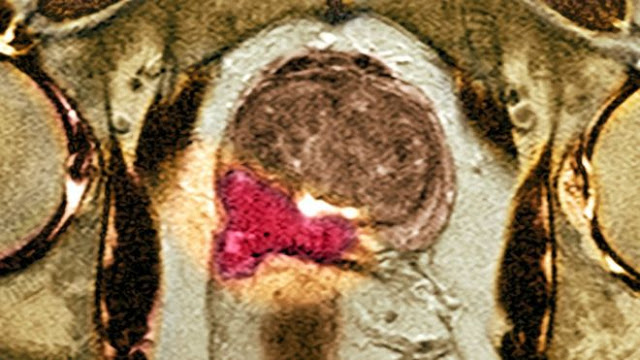The biggest leap “in decades” in diagnosing prostate cancer has been made using new scanning equipment, say doctors and campaigners. Using advanced MRI nearly doubles the number of aggressive tumors that are caught. And the trial on 576 men, published in the Lancet, showed more than a quarter could be spared invasive biopsies, which can lead to severe side-effects.
The NHS is already reviewing whether the scans can be introduced widely.
Using MP-MRI to triage men might allow 27% of patients avoid a primary biopsy and diagnosis of 5% fewer clinically insignificant cancers. If subsequent TRUS-biopsies were directed by MP-MRI findings, up to 18% more cases of clinically significant cancer might be detected compared with the standard pathway of TRUS-biopsy for all. MP-MRI, used as a triage test before first prostate biopsy, could reduce unnecessary biopsies by a quarter. MP-MRI can also reduce over-diagnosis of clinically insignificant prostate cancer and improve detection of clinically significant cancer.
93% of aggressive cancers were detected by using the MRI scan to guide the biopsy compared with just 48% when the biopsy was done at random.
Dr Ahmed, who works at University College London Hospitals, told the BBC News website: “This is a significant step-change in the way we diagnose prostate cancer.
“We have to look at the long-term survival, but in my opinion by improving the detection of important cancers that are currently missed we could see a considerable impact.
“But that will need to be evaluated in future studies, and we may have to wait 10 to 15 years.”
Prostate cancer is the most common cancer in British men, and yet testing for it is far from perfect.
If men have high prostate specific antigen (PSA) levels in the blood, they go for a biopsy.
Twelve needles then take random samples from the whole of the prostate.
It can miss a cancer that is there, fail to spot whether it is aggressive, and cause side-effects including bleeding, serious infections and erectile dysfunction.
“Taking a random biopsy from the breast would not be accepted, but we accept that in prostate,” said Dr Hashim Ahmed, a consultant and one of the researchers.
Around 100,000 to 120,000 men go through this every year in the UK.
Scanning
The trial, at 11 hospitals in the UK, used multi-parametric MRI on men with high PSA levels.
It showed 27% of the men did not need a biopsy at all.

Brian Wang is a Futurist Thought Leader and a popular Science blogger with 1 million readers per month. His blog Nextbigfuture.com is ranked #1 Science News Blog. It covers many disruptive technology and trends including Space, Robotics, Artificial Intelligence, Medicine, Anti-aging Biotechnology, and Nanotechnology.
Known for identifying cutting edge technologies, he is currently a Co-Founder of a startup and fundraiser for high potential early-stage companies. He is the Head of Research for Allocations for deep technology investments and an Angel Investor at Space Angels.
A frequent speaker at corporations, he has been a TEDx speaker, a Singularity University speaker and guest at numerous interviews for radio and podcasts. He is open to public speaking and advising engagements.


